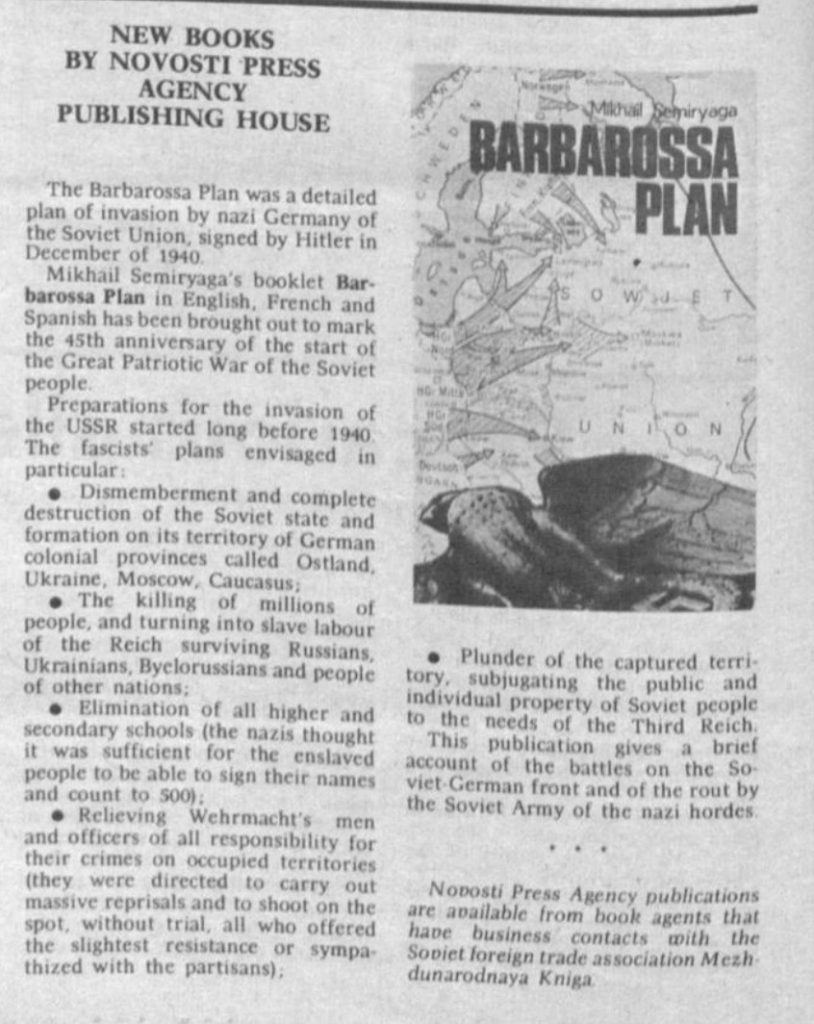By Caden Wilcox
Russian President Vladimir Putin has justified his war by claiming that Ukraine is “an inalienable part of our own history, culture, and spiritual space.” He also frequently refers to the shared fight in World War II as the basis for this imagined unity. In his Victory Day speech this year, Putin referenced how Soviet soldiers “fought the enemy outside Moscow and Leningrad, Kiev and Minsk, Stalingrad and Kursk, Sevastopol and Kharkov.”
In part this vision of wartime unity stems from Soviet-era narratives about the war. To understand them better, I turned to King Library’s digital database of The Moscow News, the English-language paper founded in Moscow in 1932. Iread articles associated with Victory Day across a four-year window (1984-1988). These publications all share content and messaging concerning warfare, national unity, and a shared Soviet identity. As Gorbachev’s Perestroika and Glasnost initiatives grew in scale during this window, Ukraine itself begins to appear in articles alongside Ukrainian voices.
In the 1984 publication, Moscow News gives little to no recognition of Ukraine’s connection to Soviet identity. Interestingly, Ukrainian city names (primarily Kyiv) were often prioritized over naming the region as a whole (5). This is not overly surprising, except that many other Soviet republics (Lithuania and Azerbaijan) were directly addressed in the same pieces. Additionally, in 1985, in an article discussing the role of national republics in the aftermath of the Second World War, Ukraine (unlike many Soviet republics) was only mentioned once, yet solely as a supplier of natural resources (11). The Soviet state controlled the publication at this time and interestingly used these highly detailed pieces to minimize Ukraine’s place in the Soviet experience. Soviet journalists chose to voice the Ukrainian Soviet Socialist Republic as an implicit extension of Russia.
By contrast, the 1986 edition contains a slightly different tone. In the article “New Books by Novosti Press Agency Publishing House,” the paper discusses steps being taken to mark the 45th anniversary of the start of the Great Patriotic War. Moscow News notes how the community is engaging with historical texts, and the article articulates the exact aggressions of the fascist regime. Critically, in the very first point, the paper directly addresses Ukraine’s destruction after the catastrophic invasion (4).
The 1987 paper had a completely altered message. In it, there was little to no mention of the nation’s victory in the Second World War. Instead, the paper primarily focuses on the Party and the continued aftermath of the terrible Chernobyl disaster. Nevertheless, it is important to note that Ukraine was noted on the second page. In this section, a foreigner discusses her perception of the nation but chooses to ground her depiction from Ukraine. Both of these examples are interesting in that they provide significant independence to the previously unrecognized region and view it as somewhat independent from Russia.
Moscow News, no. 18, 1986, p. 4
There is no way to understand the immense historical complexity of Russian-Ukrainian relations in the 1980s through these papers. Nevertheless, by seeing minor tonal and contextual shifts in Moscow News, some interesting content presents itself. The paper promotes the notion that Ukrainian identity became more independent during this time of greater openness. The 1987 paper identified Ukraine as a distinct place. Lastly, as the perception surrounding the Second World War was changing, the description of mass destruction in Ukraine acknowledged the country’s suffering in total war. Altogether, these shifts show how this Soviet newspaper adapted in its view of Ukraine’s experiences, however slightly.
As war continues to rage in Ukraine, looking into its history helps better understand its complex relationship with its Russian aggressors. Hopefully, this glimpse into Ukrainian representation during Perestroika and Glasnost helps realize the depth of Ukrainian experiences.
Caden Wilcox is a senior double majoring in REEES and economics.
References
Moscow News,No. 18, May 12, 1984,
Moscow News, No. 18, May 13, 1985,
Moscow News, No. 18, May 11, 1986,
Moscow News, No. 18, May 10, 1987, https://dlib-eastview-com.proxy.lib.miamioh.edu/browse/doc/72968542

